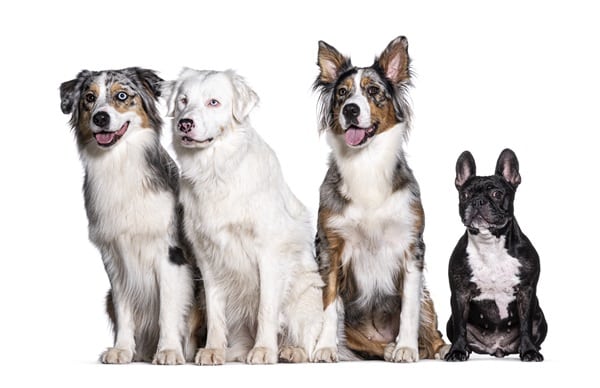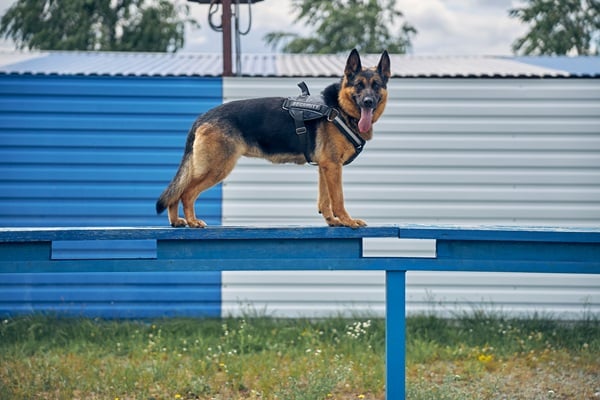Exploring the genetics of dogs provides a fascinating insight into the biological framework that defines their characteristics. Beneath the external appearance of fluffy coats and wagging tails lies a complex network of genes responsible for traits ranging from the boundless energy of a Border Collie to the steadfast loyalty of a German Shepherd. This investigation extends beyond academic curiosity; it fundamentally enhances the methods of training, caring for, and understanding the myriad of dog breeds that inhabit homes and lives. With genetic science progressing, the mechanisms influencing canine behaviors, temperaments, and health are becoming clearer. This article aims to clarify the influence of genetics in shaping the personalities and well-being of dogs.
Contents
Understanding Dog Genetics

Dog genetics serves as the cornerstone of our journey to understanding canine behavior. The science of genetics reveals how traits are passed from generation to generation, encapsulated within the DNA that carries the codes for everything from coat color to predispositions for certain behaviors. This genetic transmission is particularly fascinating in dogs due to the immense diversity across breeds, each with its unique set of inherited traits.
Breed-specific behaviors stand as a testament to the power of genetics in shaping canine dispositions. For centuries, dogs have been selectively bred to enhance traits desirable for various tasks, such as herding, hunting, and guarding. This selective breeding has honed physical attributes suited to specific jobs and deeply ingrained behavioral tendencies into the genetic makeup of these breeds. Thus, the instinctual drive of a Labrador Retriever to fetch or the herding impulses of an Australian Shepherd can be traced back to their genetic roots.
Temperament and Personality

The tapestry of a dog’s personality is colored by genetics. Temperament, often seen as the innate foundation of a dog’s personality, varies widely across breeds, suggesting a strong genetic influence. This genetic basis for temperament means that certain behavioral tendencies are hardwired into dogs before they are even born, setting the stage for future interactions with the world.
Personality traits in dogs, such as sociability, curiosity, and aggression, are also rooted in genetics. While every dog is an individual with its unique blend of traits, research indicates that genetics play a significant role in shaping these personalities. For example, a Beagle’s friendly demeanor and a Rottweiler’s protective nature can be linked to their genetic heritage, highlighting the need for prospective pet owners to consider breed-specific traits when choosing a canine companion.
Intelligence and Trainability

Intelligence and trainability are among the most sought-after qualities in dogs, both of which are significantly influenced by genetics. Cognitive abilities, including memory, problem-solving skills, and understanding of commands, vary by breed, suggesting a genetic basis for intelligence. Some breeds, like Border Collies and Poodles, are renowned for their quick learning and adaptability, traits that have been carefully selected for over generations.
Trainability is closely tied to a dog’s cognitive abilities and has a strong genetic component. This aspect of canine behavior underscores the importance of genetics in determining how easily a dog can be trained. Breeds with a history of working closely with humans tend to be more receptive to training, reflecting the genetic selection for these traits. However, it’s crucial to recognize that while genetics set the potential for intelligence and trainability, the environment and training methods play pivotal roles in realizing this potential.
Social Behavior and Aggression

Social behavior in dogs encompasses a wide range of interactions with humans and other animals, heavily influenced by genetic predispositions. The inclination of some breeds to be more friendly or aloof can often be traced back to their genetic lineage, underscoring the complex interplay between genetics and social behavior. This genetic influence extends to aggression, a trait that has been selectively bred in some breeds for protective purposes but can pose challenges in domestic settings.
The nature versus nurture debate is particularly relevant to social behavior and aggression. While genetics provide the blueprint for these behaviors, environmental factors, including upbringing, socialization, and training, play critical roles in shaping how these genetic tendencies are expressed. Understanding the genetic predispositions of different breeds can aid in creating supportive environments that mitigate unwanted behaviors and promote positive social interactions.
Health and Behavioral Issues

The intersection of genetics with health and behavior in dogs reveals a complex relationship where physical health can significantly impact behavior. Genetic conditions, such as hip dysplasia or thyroid disorders, can influence a dog’s behavior due to pain or hormonal imbalances. Recognizing the genetic basis for these conditions can aid in early diagnosis and management, improving the quality of life for affected dogs and potentially mitigating behavior issues stemming from discomfort or distress. This awareness underscores the importance of genetic health screening and responsible breeding practices to minimize the prevalence of inherited health conditions in dogs.
Behavioral disorders in dogs, such as anxiety, obsessive-compulsive behaviors, and aggression, can also have a genetic foundation. While not all behavioral issues are directly caused by genetics, understanding that certain breeds may be predisposed to specific disorders is crucial for early intervention and management. This knowledge enables dog owners and professionals to tailor their approach to training and care, ensuring that these dogs receive the support and guidance needed to lead balanced and fulfilling lives.
The Role of Environment

The debate between nature (genetics) and nurture (environment) in shaping a dog’s behavior is ongoing, but it’s evident that both play pivotal roles. Genetics lays the foundation for a dog’s potential behaviors, but the environment in which a dog is raised can significantly influence how these genetic predispositions are expressed. A nurturing, stimulating, and supportive environment can enhance positive and mitigate negative behaviors, demonstrating the power of external influences in shaping a dog’s behavior.
Environmental factors, such as early socialization, training, the owner’s behavior, and even diet, can impact the expression of genetic traits. For instance, a dog genetically predisposed to aggression may exhibit less problematic behavior with proper socialization and training. Conversely, a genetically sociable dog might develop fearfulness or aggression if raised in an abusive or neglectful environment. This interplay highlights the importance of providing a positive environment that encourages the expression of desirable behaviors while managing or modifying less favorable ones.
Genetic Testing for Dogs

Genetic testing has emerged as a valuable tool for uncovering a dog’s genetic predispositions, offering insights into potential health issues, behavior tendencies, and ancestry. The benefits of genetic testing extend beyond curiosity, providing actionable information that can guide breeding decisions, health management, and understanding of behavior traits. Knowing their pet’s genetic makeup can help dog owners anticipate and manage breed-specific behaviors and health risks.
Interpreting genetic test results can be complex, but understanding these results can profoundly impact pet owners’ and breeders’ decision-making. Genetic testing enables a proactive approach to health care, behavior management, and even training strategies tailored to the individual dog’s needs. As genetic testing becomes more accessible and comprehensive, its role in enhancing the lives of dogs and their owners continues to grow, emphasizing the importance of genetics in the holistic understanding of canine companions.
Training and Managing Genetic Behaviors

Effective training strategies acknowledge the role of genetics in shaping a dog’s behavior, adapting techniques to align with the dog’s inherent tendencies. Recognizing that some breeds are more predisposed to certain behaviors allows for developing customized training programs that positively harness these natural inclinations. For example, training a herding breed involves channeling its instinctual behaviors into appropriate activities, whereas training a guard dog focuses on control and discipline.
Behavioral management, particularly for genetically influenced behaviors, often requires a multifaceted approach. Environment, training, and sometimes medical intervention play roles in managing behaviors with a genetic basis. Professional trainers and behaviorists can be invaluable in addressing these issues, offering expertise in modifying or managing behaviors effectively. The goal is not to suppress the dog’s genetic nature but to live harmoniously with it, recognizing and respecting the genetic predispositions while guiding the dog toward behaviors that are conducive to a shared happy life.
Final Thoughts
The journey through genetics and its influence on canine behavior reveals a multifaceted picture of our beloved pets. Genetics provides the framework within which a dog’s personality, intelligence, and behavior are molded, yet the interplay with environment, training, and care ultimately shapes the dog’s life. Understanding the genetic underpinnings of our dogs’ behaviors enhances our ability to care for them, tailor our training methods, and appreciate the diversity and complexity of the canine world. As we unravel the mysteries of dog genetics, we pave the way for more informed breeding, better health care, and deeper bonds between dogs and their human companions, celebrating the unique traits that each dog brings into our lives.


